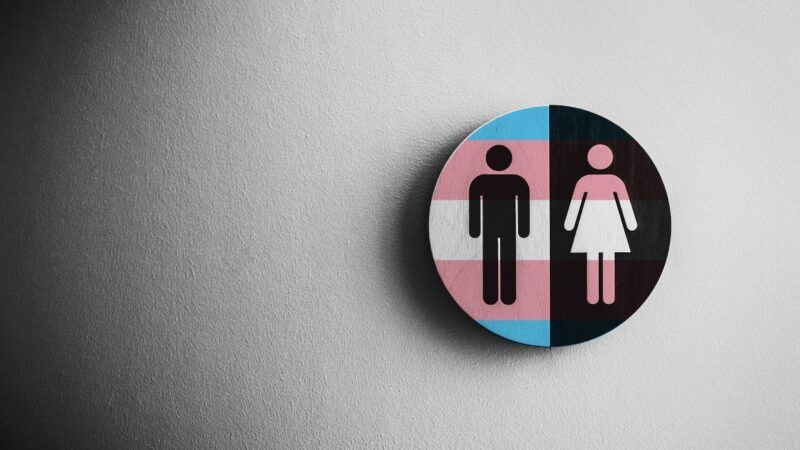Tennessee Orders Private Businesses To Warn About Possible Trans People in the Bathrooms
Fearmongering culture panic leads to a new dumb low.

There are thoughtful debates surrounding the best way to accommodate transgender people in public facilities and student activities. What's the best way to respect both a trans person's identity and a women's need for privacy? Is it fair for trans teens girls, while early in their transition, to be allowed to compete in sports with cis girls, while the former may still have biological advantages?
Sidestepping these legitimate questions entirely in favor of ginned-up culture war outrage, Tennessee's Republican Gov. Bill Lee on Monday signed into law H.B. 1182, which requires all public and private facilities and businesses to post warning signs that they let trans people use the bathrooms.
H.B. 1182 orders that any business that "allows a member of either biological sex to use any public restroom within the building or facility shall post notice of the policy at the entrance of each public restroom and at each entrance of the building accessible by the general public."
The sign is required to read, "This facility maintains as a policy of allowing the use of restrooms by either biological sex, regardless of the designation on the restroom." The bill demands the sign be at least 8 inches wide and 6 inches tall, comply with the Americans with Disabilities Act, and even demands certain colors be used.
This isn't the only anti-trans bill Tennessee has recently passed, just the dumbest. Lee signed H.B. 1233 on Friday, a bill that opens up public schools to civil lawsuits if administrators allow trans people to use the restrooms or locker rooms of their chosen gender rather than their birth sex.
The obvious result of the signage order will be that every single private business and public facility is going to have to put these signs up since they're not going to actually police who uses which restroom.
H.B. 1182 adds this section to the state's building codes, which lists violations of any of the codes as Class B misdemeanors, subject to fines of up to $500 and potentially six months in jail. Even if a state official isn't terribly interested in enforcing the law this way, people may still go around looking for non-compliant businesses to complain about.
It is almost comically reminiscent of the effects of California's Proposition 65, which requires businesses and facilities to warn customers about potentially hazardous chemicals being used on the site with mandatory signs. The problem is that the list of hazardous chemicals is so inclusive (and stupid—the state is currently in a fight over whether coffee qualifies) that the Prop. 65 warning sign is found in pretty much every single business in the state. But since the signs are ubiquitous, they serve no meaningful purpose or warning. Still, failing to comply can lead to lawsuits from either the attorney general's office or from private citizens.
Similarly, this mandatory signage concerning who uses which bathrooms and locker rooms will provide no meaningful information and make nobody safer. It will, however, mandate that private businesses put up unnecessary signs with absurd messages under threat of punishment for non-compliance. That's not exactly small government in action.


Show Comments (107)